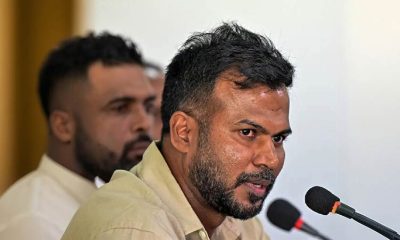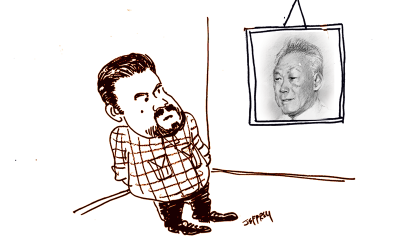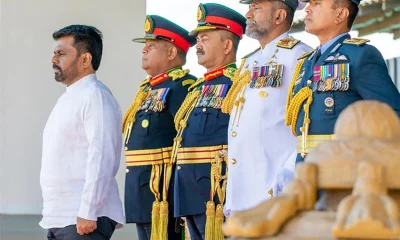Editorial
Interval in hell?

Friday 1st October, 2021
The 40-day lockdown, which was not a lockdown, paradoxical as it may sound, has been officially lifted. Surprisingly, there have been significant decreases in the Covid-19 cases and fatalities. If it had been strictly enforced, it would have yielded much better results.
Nobody took the lockdown and the quarantine curfew seriously. People moved about freely; shops were open; roads were congested, and even liquor outlets and taverns were allowed to reopen towards the latter stages of the lockdown, which nevertheless worked, but this may encourage the public to throw caution to the wind when the country fully reopens today.
The government has rightly decided against easing restrictions on inter-provincial travel. Otherwise, holiday resorts in all parts of the country would have become pandemic hotspots with thousands of people converging there, as was the case in April. Restrictions on religious, cultural and social gatherings, too, must not be lifted until health experts give the all-clear.
The drop in Covid-19 fatalities was mostly due to the successful vaccination programme, and the spread of the pandemic slowed down because most private and public sector employees did not travel to work; schools remained closed, and buses and trains did not operate. The situation is bound to change when the state and private institutions reopen and public transport limps back to normalcy. There’s the rub.
Private bus operators have undertaken to adhere to the pandemic prevention protocol, but they will do so only for a few days with the police going all out to ensure compliance. Thereafter, they will revert to their old ways. People are likely to take the health guidelines for granted with the passage of time, and the country will be back to square one. We have seen this happen after the lifting of previous lockdowns and quarantine curfews.
When there are not enough buses on the road, commuters who are desperate to go to work or return home, jostle and shove to get into the few available ones, exposing themselves as well as others to serious health risks. The same goes for trains, and office and school vans. Having beaten a retreat, the virus must be waiting until these vehicles are back on roads to make a comeback. It has done so in the past, and if it is allowed to bounce back, what was gained during the ‘lockdown’ will be lost in a few weeks.
Technology has provided solutions to most of the problems the pandemic has created. Remote work is prominent among them. It has become the order of the day in the world of work, and made an enormous contribution to pandemic control by reducing the number of people travelling to work. It must be promoted as a national priority here with all necessary facilities and equipment being made available. It benefits both the employer and the employee alike. The institutions that encourage their employees to work from home deserve incentives from the state.
Lockdowns, no doubt, serve a very useful purpose. They help the health sector recover from capacity crunches and ramp up vaccination. But closing a country when the Covid-19 infections and deaths soar and reopening it when the situation improves cannot be considered an effective pandemic control strategy. Most countries have adopted this method only to get caught in a cycle of imposing lockdowns and easing them.
The UK took a bold step. It decided to take a calculated risk by remaining open after achieving its vaccination target. The British government came under blistering criticism for its move, which was also a huge political gamble. But it seems to have worked––so far so good! It should be the fervent hope of people across the globe that the English experiment will reach fruition so that other countries could do likewise, for lockdowns entail huge socio-economic costs and, most of all, are not a solution. They delay economic recovery and worsen poverty and inequality among other things.
The responsibility for pandemic control lies with everyone, and the onus is on the public to act responsibly without inviting trouble unlike in the past. Otherwise, the respite we have got with the help of the costly lockdown, which ends today, will be tantamount to the proverbial interval in hell.
Editorial
‘Swindlers List’

Thursday 26th December, 2024
Power not only corrupts but also makes the wielders thereof cherish the delusion that popular mandates are cartes blanches for them to do as they please and be above the law. This fact has been borne out by the despicable manner in which the President’s Fund has been misused, if not abused, under successive governments.
Thankfully, the President’s Fund is now under the microscope, and numerous questionable fund allocations have already come to light. It has been revealed that the Executive Presidents during previous dispensations arbitrarily allocated money from the President’s Fund to their kith and kin at the expense of the needy on the waiting list.
The JVP-led NPP government has released a list of politicians who have obtained money from the President’s Fund over the years in violation of the terms and conditions governing the provision of relief therefrom. All of them have obtained huge sums of money by leveraging their political connections, and those shameless characters include a tainted politician who fell off an upper-floor balcony of a hotel down under, over a decade ago, while trying to enter an adjoining room a la Spider-Man; he eventually got entangled in a web of lies of his own making.
Embroiled in an academic credentials scandal and unable to make good on its election promises and solve burning issues such as the shortages of rice and coconut and the soaring prices of essentials, the NPP government is all out to divert attention from its failure by carrying out propaganda attacks on the Opposition, which is on the offensive. However, the release of the Swindlers List, as it were, and the police probe into the misuse of the President Fund are most welcome. This has been an unintended benefit of the ongoing propaganda battle between the government and the Opposition.
As for financial assistance from the President’s Fund for patients, one of the conditions stipulated by law is that the family of the patient seeking relief is without adequate financial resources to meet the cost of surgery/treatment. It has also been specified that the monthly income of the family including the patient, spouse and unmarried children should not exceed Rs. 200,000, and a Divisional Secretary should recommend that the person concerned is eligible for financial assistance.
The President’s Fund relief scheme for patients was launched to provide financial assistance to low-income individuals who lack the means to bear the costs of medical treatment or surgery. It is therefore wrong for the President and/or the governing board of the Presidential Fund to grant funds to those who have the wherewithal to afford treatment or surgery either in this country or overseas.
Obviously, politicians who spend colossal amounts of money on their election campaigns and live the high life, residing in palatial houses, moving about in super-luxury vehicles, and travelling the world, are not eligible for financial assistance from the President’s Fund.
The CID is reported to have been called in to investigate the misuse/abuse of the President’s Fund. One cannot but agree with the incumbent government on this score although it is driven by an ulterior motive. One can only hope that the ongoing investigation will reach a successful conclusion, and legal action will be instituted against all those who are responsible for the misappropriation of state funds.
The Swindlers List submitted by the NPP government to Parliament is incomplete; it contains only the names of Opposition politicians. The public has a right to know how all Presidents have misused/abused the President’s Fund since 1978. Are there any individuals connected to the JVP or the NPP among those who have received financial assistance from the President Fund fraudulently, as claimed by Opposition MP Dayasiri Jayasekera, one of those exposed by the government?
Let Minister and Cabinet Spokesman Dr. Nalinda Jayatissa be urged to make public a complete list of beneficiaries of assistance from the President’s Fund instead of releasing names selectively to settle political scores. The NPP government, which is full of self-righteous members, should be able to do so if it has nothing to hide. It is hoped that the Opposition MPs who have not abused their political connections to obtain assistance from the President’s Fund will crank up pressure on the government to do so.
Editorial
Of that half-open can of worms

Wednesday 25th December, 2024
The CID has once again proved its selective efficiency and adeptness at doing political work. No sooner had it received a complaint from Justice Minister Harshana Nanayakkara that someone had sought to discredit him by having the title, ‘Dr’, placed before his name on the parliamentary website than it launched an investigation, interrogated the parliament staff and recorded statements, but its probe has apparently come up against a brick wall.
Parliament workers have reportedly informed the CID that the titles given to the NPP MPs on the House website are based on information contained in a letter sent by the office of the Leader of the House, Bimal Ratnayake. What is described as an image of the letter in question is doing the rounds in the digital realm. The government has chosen to remain silent on the letter and the progress in the CID probe, which is bound to open a can of worms for it.
What will the CID do now? Will it grill the staff of the Leader of the House as well? It will be interesting to see what the government’s reaction is. Will the Justice Minister, who thinks there has been a sinister campaign against him, urge the CID to go the whole hog and get to the bottom of it?
Strangely, an official of the Parliament Communication Department apologised to Minister Nanayakkara for what he called an inadvertent data entry error which had led to the placement of ‘Dr’ before Nanayakkara’s name. He issued a statement to that effect when the Opposition raised questions about the academic credentials of the NPP MPs. He owes an explanation to the public.
Minister Nanayakkara, after lodging his complaint with the CID, told the media that he suspected that there was a conspiracy to tarnish his image. Implying the involvement of his political opponents in ‘the conspiracy’, he went on to claim that ‘the dog’ (read the previous dispensation) had been got rid of but there were some ‘fleas’ left, and they too would be dealt with appropriately. He also expressed concern about what he called a counterrevolution.
The Justice Minister has caused a great injustice to man’s best friend. The NPP won elections by condemning the members of the previous government as a bunch of crooks who deserved to be behind bars for their many crimes; they included a politician who lined his pockets at the expense of cancer patients. Now, the Justice Minister likens those characters to canines!
The mention of ‘counterrevolution’ must have sent a chill down the spines of those who are au fait with world history, especially the brutal manner in which some self-proclaimed socialist regimes dealt with ‘counterrevolutionaries’; they resorted to witch-hunts and kangaroo trials which led to the elimination of dissenters. This country is no stranger to savage political violence.
Going by the aforesaid leaked letter, a wag asks whether the office of the Leader of the House has become the cradle of the ‘counterrevolution’ and home to the ‘fleas’ that have left the ‘dog’ in flight.
It defies comprehension why Minister Nanayakkara made a beeline for the CID over the doctorate issue. He should have taken it up with the Speaker and the Secretary General of Parliament and asked for remedial action. That is the proper procedure. Unfortunately, aspersions are now being cast on certain parliament officials.
The NPP parliamentary group has some members who served in previous parliaments and therefore are familiar with parliamentary affairs, and it is incumbent upon them to guide their junior colleagues.
Editorial
Grim Reaper in overdrive

Tuesday 24th December, 2024
A sharp increase in fatal road accidents during the past few weeks has jolted the police into inspecting vehicles to check their roadworthiness. As many as 13 lives were lost in road mishaps on Saturday (21). It is believed that many such accidents occur due to the sheer number of unroadworthy vehicles on the road, posing safety risks to motorists, passengers and pedestrians alike. The police must step up inspections and prosecute the drivers and owners of unsafe vehicles.
In 2023, about 2,500 lives were lost in 2,200 road accidents in Sri Lanka, according to the police. Pedestrians accounted for the highest number of road traffic fatalities––more than 740.
Legal action must be instituted against those who issue bogus fitness certificates for unroadworthy vehicles, especially buses and trucks. If the existing laws do not provide for deterrent punishment for them, new ones will have to be introduced as a national priority.
A World Bank (WB) report, Delivering Road Safety in Sri Lanka Leadership Priorities and Initiatives to 2030, provides a number of valuable insights into the deterioration of road safety in Sri Lanka, and spells out what needs to be done to remedy the situation. The following, inter alia, have been identified as the causative factors: an increase in the number of vehicles, poor road maintenance, improper road expansion, less scrutiny in issuing driving licences, ineffectiveness of the authorities in penalising road traffic offences, and inefficiency of public transport system. Citing anecdotal evidence, the report points out that speeding, drunk driving, fatigue, tyre bursts, animal crossing and unprotected level crossings are some other causes of road accidents. The ever-increasing narcotic addiction among drivers of heavy vehicles has also become one of the main causes of road fatalities.
The aforesaid WB report informs us that Sri Lanka will need an additional investment of USD 2 billion to achieve the Sustainable Development Goal (SDG) 3.6 target of a 50% reduction in national road crash fatalities. Given Sri Lanka’s economic crisis, such a huge investment is not within the realm of possibility, but it is a goal that the country must work towards. There are several practicable measures that can be adopted to save lives in the meantime, vehicle inspections being one of them.
Thanks to stern police action, drunk driving menace is believed to have been brought down to a manageable level, but there has emerged another problem—narcotic addiction among bus and truck drivers.
Lanka Private Bus Owners’ Association President Gemunu Wijeratne is on record as having said that 50% bus drivers and conductors are addicted to drugs countrywide. In 2021, then State Minister Dilum Amunugama revealed that 80% of the bus drivers in Colombo and its suburbs worked under the influence of narcotics. A pilot project conducted by the police last year helped nab about 100 drug addicts behind the wheel. Most of them were addicted to crystal methamphetamine popularly known as ICE. This points to the pressing need for random narcotic detection tests to be increased.
The least that can be done to reduce road accidents and save precious lives is to have the police step up operations to nab drug/alcohol addicts behind the wheel, rein in reckless drivers, find unroadworthy vehicles and bust rackets related to the issuance of driving licences and vehicle fitness certificates. That may be the way to make the Grim Reaper, currently in overdrive, downshift and slow down until a comprehensive road safety programme is launched with the participation of all stakeholders to achieve the SDGs.
-

 Sports7 days ago
Sports7 days agoSri Lanka to mend fences with veterans
-

 Sports5 days ago
Sports5 days agoPathirana set to sling his way into Kiwi hearts
-

 Opinion7 days ago
Opinion7 days agoIs AKD following LKY?
-

 News3 days ago
News3 days agoOffice of CDS likely to be scrapped; top defence changes on the cards
-

 News6 days ago
News6 days agoSL issues USD 10.4 bn macro-linked bonds
-

 Opinion7 days ago
Opinion7 days ago‘A degree is not a title’ – a response
-

 Editorial6 days ago
Editorial6 days agoRanil’s advice
-

 Editorial7 days ago
Editorial7 days agoLest watchdogs should become lapdogs











